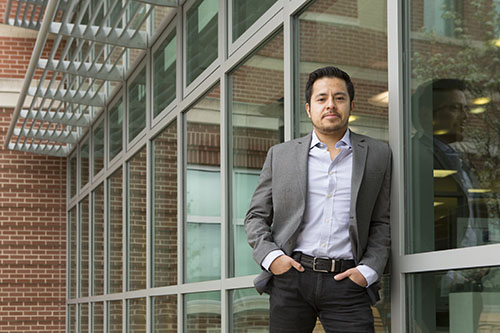Alumnus works with migrant college student population

José Eduardo Huerta’s parents moved to America to give their four young children a chance at an education and a better life.
“I’m the oldest in my family,” he said. “When I was 12, my parents told my sisters and me, like many migrant families do, that we were leaving Mexico so we could have an opportunity for better education.”
When Huerta started middle school in Salinas, Calif., he knew only a few sentences of English. Today, he’s pursuing a dual master’s degree in public administration and student affairs administration (MPA-MSAA) in the College of Community and Public Affairs (CCPA).
Huerta believes student success — at any level of education — ultimately relies on your support system.
“I was the first person in my family to go to college. I didn’t have the social capital to understand the college admission process,” Huerta said. “Throughout my career as a student, I have received a lot of support from student affairs professionals, which is why I want to help students in my own career.”
Huerta’s parents, farm workers in Mexico and the United States, have always pushed their children to continue their education. In 2007, Huerta was accepted to the University of California-Berkeley on a full educational opportunity scholarship.
“Even though my parents don’t speak English — so they were never able to help me schoolwork — they have always provided me with moral support and done everything they can to help me. They’ve supported all of my decisions.”
As an undergraduate student, Huerta studied abroad in Brazil for a semester: “It exposed me to how big the world is, pushed me out of my comfort zone, and I got the travel bug. From that moment I wanted to meet new people and cultures because those interactions helped me understand the value of diversity, equity and justice, in addition to providing numerous opportunities for reflection and personal growth. I also learned to speak Portuguese.”
After graduating from Berkeley, Huerta took a two-year gap prior to pursuing his master’s. He worked as a substitute teacher and literacy tutor before moving into the public sector, working in human resources for Monterey County.
Huerta said coming to the University made sense given his interest in public service and higher education.
“I knew I wanted the flexibility to work in an academic, nonprofit or local government setting. The [MPA-MSAA] degree is very unique, there aren’t many programs like it in the country.”
Huerta packed all of his things into his compact car and drove across country to start a new chapter.
“I arrived in Binghamton a few days before classes without an apartment. I researched listings on a computer at the Broome County Library, and I was ready to sign a lease after a few hours,” said said, who attended Binghamton for his master’s education from 2013 to 2016.
While at Binghamton, Huerta spent a winter semester in Shenzhen, China, with the Public Administration Department’s study-abroad program. He also worked as a graduate assistant at the University’s Center for Teaching and Learning. He collaborated with the schools and colleges across campus to develop interactive and informative pre-orientation materials for new students.
Huerta said that although his parent did not have the “social capital” needed to help him get ahead, they supplemented that with grit and perseverance, ultimately instilling the same work ethic in Huerta.
“Their hard work planted the seed for all of my success up until this point,” he said. “Now it’s my turn to show them how I can grow.”
Huerta’s parents were able to see their son walk across the stage at Commencement in May. After graduation, he joined SUNY Oneonta as a recruiter for the campus College Assistance Migrant Program.
Huerta said the program provides a financial scholarship and academic support to students from migrant and seasonal farm-working families in New York state.
According to Huerta, the program is designed to serve the needs of the college youth, and their families, by giving them a unique “home away from home” experience while attending college. Huerta feels like everything has “come full circle” in that he’s able to support youth with similar backgrounds in getting access to higher public education.
“I am proof of the difference education can make in someone’s life,” Huerta said. “I feel grateful for the opportunity to help students like me develop through their academic journey and realize their potential.”

